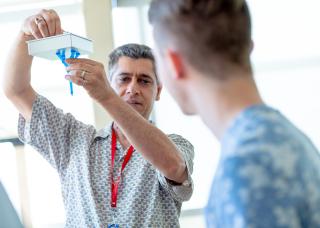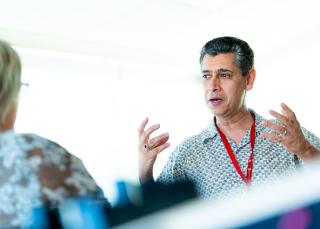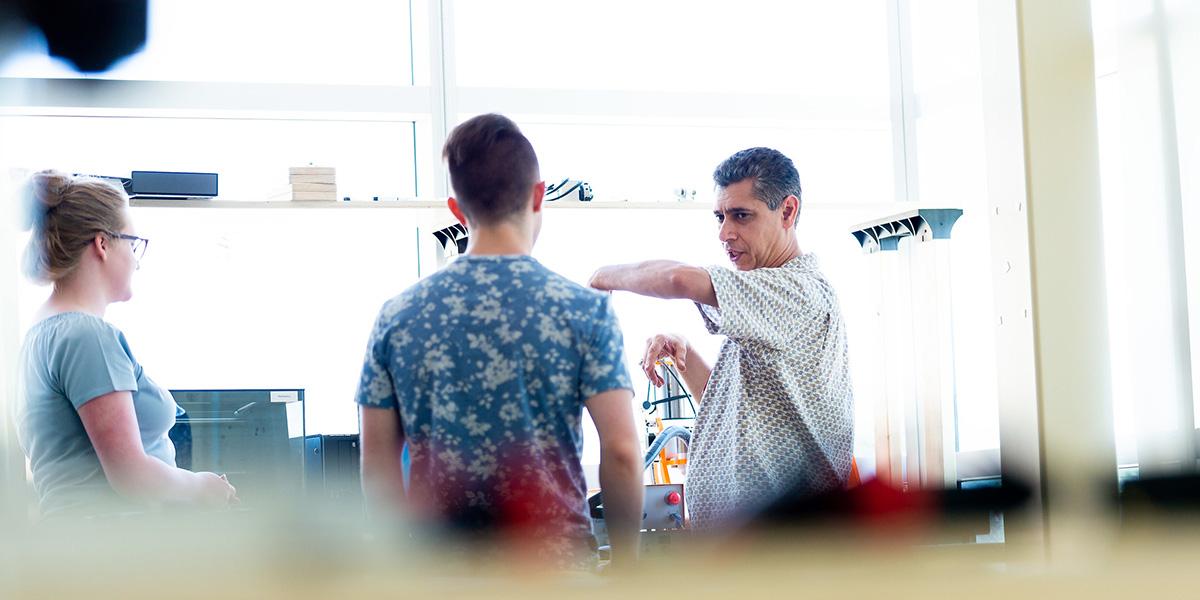Encouraging empathetic engineers who will make a positive impact on the world
UBC Okanagan's Dr. Ray Taheri inspires students to advocate for the less fortunate through the power of education and humanitarian work

UBC Okanagan's Dr. Ray Taheri inspires students to advocate for the less fortunate through the power of education and humanitarian work

Picture the scene. A bleary-eyed engineering student slumps into their seat for an 8:00 a.m. lecture. It's unlikely in that moment that they are pondering how they might change the world. But give them one hour with Dr. Ray Taheri, Professor of Teaching in the Faculty of Engineering at UBC Okanagan, and that may well be what they set out to do.
"The number one reason students say they come to higher education is to get a job and to make a living, but I want to encourage my students to widen their perspective by pursuing experiential learning opportunities to acquire all the skills necessary to make an impact beyond UBC," says Ray. He does this by exposing them to projects that strengthen the critical thinking, creativity and collaboration skills they need to succeed in today's evolving economic landscape, as well as by leading by example.
As part of Ray's drive to show his students they have a crucial role to play in society after graduation, he uses his expertise acquired at UBC, and over the course of his career, to contribute to humanitarian causes. Through these experiences, he encourages his students to incorporate empathy into their design thinking.
"Students don't care about how much I know, unless they know about how much I care," he states.
During a sabbatical earlier this year, Ray travelled to Oradea, Romania and the Republic of Moldova to distribute funds from his late friend's endowment to various educational establishments.
A big proponent of maker spaces – areas in an educational setting where students can come together to experience hands-on learning – Ray used his engineering expertise to establish maker space facilities, with 3D printers, in a total of five high schools. He also spent time training the students to use the equipment.
"I wanted those high school students to learn from a very early age, to foster their creativity and encourage them to take their education to the next level," he reflects. "They were very happy and never imagined they would have such equipment."
During the trip, Ray also offered two teaching workshops to over 120 educators at the University of Oradea and provided educational equipment and books to a newly constructed library within a historical church which had been damaged by flooding two decades ago. He also gave some of the endowment to daycares and kindergartens in need of educational equipment.
He was moved by the poor conditions faced by many young people he met in the Republic of Moldova which neighbours Ukraine. "It was so sad to see in those regions that are devastated by war that there are classrooms with grades one to five in the same class because they can't heat five rooms. It is upsetting that there are places where kids can only have one meal."
Despite their disadvantages, Ray observed a determination to become educated. "They want to be better in order to help one another," he said.

"Empathy is the reason I went on my sabbatical; I have to practice what I preach to my students at UBC," he adds.
When describing his experience to his UBC students, Ray told them: "You have everything that these people wish to have, so you should not waste this ocean of opportunity."
He regularly highlights global inequalities such as poverty in a bid to encourage students to use their privileged position to change lives for the better. As a result, Ray observes that "most of the students get very inspired."
"In my lectures, I tell my students: 'You have to be the voice of those who don't have a voice,'" he says.
Closer to home in the Okanagan, project-based learning is another way in which Ray equips his students with the skills needed in today's workplaces. "I have to try to teach something that they cannot Google," he says.
He tasks his students with designing items that will benefit society. "Project-based learning is good only if the project is meaningful," he states. His students are enthused by working on initiatives where their creativity and problem-solving skills are having a positive impact. Recent examples include Ray's students making clothing bins safer, creating 3D-printed face shields during COVID-19, and winning top spots in the 2021 AquaHacking Challenge with innovative water filtration solutions.
UBC Okanagan's maker space – which serves as a hub for innovation, cross-discipline collaboration and entrepreneurship – is where Ray witnesses his students gaining confidence by working with, and learning from, their peers. "Many students make good friendships through this process and gain the softer skills such as teamwork, leadership, conflict resolution and time management."

Ultimately, the reason Ray pours so much of himself into his teaching, at and beyond UBC, is a desire that his daughters will experience an impassioned educator. "I want someone like myself to teach my daughters," he reflects. Ray also reveals that every time he enters the lecture hall, he thinks: "Maybe today's the day where I say or do something that changes one person's mind, and maybe that person changes the world."
As well as inspiring young minds, Ray's future goals include continuing to share his pedagogical experience with his peers globally and furthering the active biomechanics research he is currently conducting with a colleague.
Written by Meadhbh Monahan, UBC Internal Communications
Interviewed in October 2023
"Maybe today's the day where I say or do something that changes one person's mind, and maybe that person changes the world."
Dr. Ray Taheri, Professor of Teaching in the Faculty of Engineering at UBC Okanagan
Find the latest news, updates, events, and useful dates from across UBC, curated for faculty and staff by Internal Communications.
Access a library of resources from multiple UBC websites, all in one place.